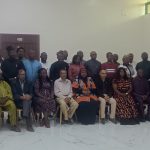A Professor of Socio-Cultural History and Gender Studies, Victoria Kikelomo Olugbemi, has called for a decisive shift from the western-style democratic model, which she said has failed to deliver stability, development, and national cohesion in Africa, particularly Nigeria.
Professor Olugbemi made this call while delivering the 40th Inaugural Lecture of Adekunle Ajasin University, Akungba Akoko, Ondo State. She argued that moving away from political systems modelled on European structures would accelerate Africa’s development.
She advocated a radical transformation in Nigeria’s governance framework, urging a return to indigenous political systems as a way of resolving Africa’s and Nigeria’s longstanding leadership and governance crises.
Olugbemi stressed that African leaders must embrace indigenous governance systems grounded in precolonial traditions, gender equity, and cultural values, saying this would help lay the groundwork for national stability and sustainable development.
She urged the National Assembly to abandon the habit of seeking political models outside Nigeria and Africa.
She said, “African civilization remains the most enduring in history. Therefore, African leaders should have a complete shift from modelling their political systems after European structures and instead adopt indigenous frameworks to accelerate development of Africa’s local and regional development.
“The National Assembly should shift their focus from looking outside Nigeria and Africa for suitable political system if we want Nigeria to become a developed nation.
“It is my belief that the system of checks and balances in African Kingdoms before the advent of the two Abrahamic religions which ensured political stability can serve as a foundation for building a resilient and prosperous nation in Nigeria.”
Olugbemi emphasised the sacred role of traditional leadership, asserting that “traditional rulers, as descendants of royal bloodlines, should be seen as divine representatives.”
She insisted that their selection and installation must strictly follow “precolonial customs and traditions,” and not be subject to government procedures.
According to her, monarchs are ordained by God and must not be treated as political appointees. She added that traditional institutions possess internal mechanisms of checks and balances that should be relied upon to address misconduct, rather than the temporary systems of modern governance.
Addressing the theme of gender and national development, Olugbemi stated, “A nation’s strength lies in achieving gender balance,” asserting that both men and women must be given equal opportunities to shape and sustain national progress.
She argued that societies must move “beyond the limitations of patriarchy and authoritarianism,” and embrace the idea that gender, religion, and culture—when positively interwoven—serve as “forces of liberation and pillars for rebuilding a powerful and stable Nigeria.”
She identified gender, religion, and culture as crucial to a nation’s destiny, determining whether an empire survives or collapses. She warned that leaders, institutions, and the media must frame these issues with “careful consideration to avoid triggering instability.”
The inaugural lecturer also stressed the importance of inclusive and quality education for both boys and girls as a cornerstone of national development. She noted that “education nurtures political stability through mutual respect and collaboration.”
She advocated increased budgetary allocation to address the growing needs of student populations, teacher recruitment, learning materials, and infrastructure.
ALSO READ: WHO calls for urgent action to protect African youths from tobacco industry tactics
Criticising government preference for private institutions, Olugbemi said, “Approving more private universities while neglecting public ones contradicts the government’s own Education for All (EFA) mandate.”
She called for a comprehensive overhaul of the school curriculum to promote civic responsibility and patriotism, saying, “training students in national history and civic responsibilities will promote an egalitarian society and strengthen the foundations of nation-building.”
She also urged greater attention to the plight of out-of-school children, saying, “bringing them into adult education systems can alleviate hunger and poverty and support Nigeria’s efforts toward achieving the Sustainable Development Goals (SDGs), particularly gender equality and lifelong learning.”
In his remarks, the Vice Chancellor, Professor Olugbenga Ige, commended the lecturer for her commitment to scholarship, gender advocacy, and service to humanity.
ALSO READ TOP STORIES FROM NIGERIAN TRIBUNE
WATCH TOP VIDEOS FROM NIGERIAN TRIBUNE TV
- Let’s Talk About SELF-AWARENESS
- Is Your Confidence Mistaken for Pride? Let’s talk about it
- Is Etiquette About Perfection…Or Just Not Being Rude?
- Top Psychologist Reveal 3 Signs You’re Struggling With Imposter Syndrome
- Do You Pick Up Work-Related Calls at Midnight or Never? Let’s Talk About Boundaries







